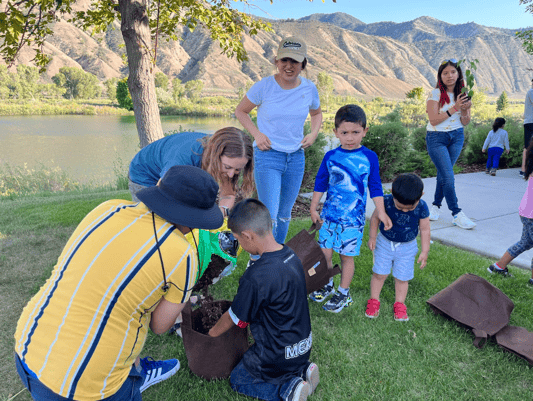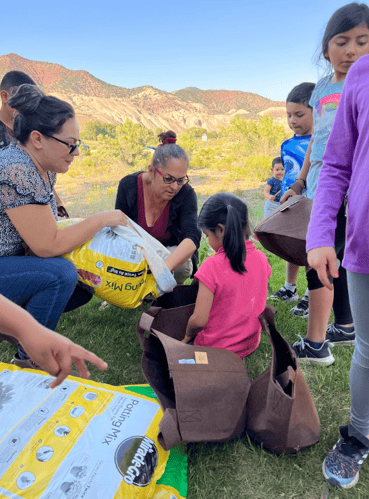It’s been a very long winter here in Eagle County, and it’s time to consider how you’re going to help your plants thrive this summer. Almost more important than providing sun and water to your plants is making sure that your soil is healthy! Though a little more complex than finding a sunny location, providing nutrients to your plants can be a gamechanger in your garden, and it’s really not that hard to do.

Grow Smart Eat Smart Gardening Class a program created between CSU Extension and our Eagle Valley Outdoor Movement initiative.
There are many options for soil amendments, all providing different benefits to your plants. A soil amendment is anything that can be added to soil to help plants grow. They do not have a legal definition for soil nutrition, but they can be very helpful in providing specific nutrients to your soil. Compost, a common amendment to gardens, is considered a soil amendment rather than a fertilizer, and can provide a huge benefit to your plants. There are also very specific soil amendments like iron that do not provide broad spectrum benefits to your plants, but can help mitigate a specific plant issue.
Products labeled as fertilizers however, are required to contain, and provide specific information about three specific soil amendments, nitrogen (N), phosphorus (P), and potassium (K). These are listed on fertilizers in the form of three numbers known as the NPK ratio.These three nutrients are vital to plant growth, and can also be in soil amendments, but fertilizers often focus on providing high amounts of these three. Looking at these ratios can help determine what type of fertilizer to purchase. The plants you are trying to fertilize are important to consider too, plants have different needs depending on if they are a fruiting plant, flowering plant, or leafy plant. Having too much of specific nutrients can actually hurt more than it helps. For example, excessive phosphorus can aggravate iron and zinc deficiencies and increase soil salt content.

Grow Smart Eat Smart Gardening Class a program created between CSU Extension and our Eagle Valley Outdoor Movement initiative.
According to Colorado State University Extension, our Colorado soils are often higher in phosphorus and potassium content, and both of these nutrients tend to stay in our soils longer, so you may not have as much of a need for these nutrients. You may need a high ratio of P and K in establishing new garden beds. To be absolutely sure what your garden or lawn needs, you can get a soil test done. Locally, one option to do this at a relatively low cost is the CSU Extension office in Eagle.
Environmental concerns about fertilizers should not be ignored, and can be mitigated by thinking critically about what type of fertilizer you want to use, and how you are going to apply it. An organic fertilizer is one in which the materials are derived from natural sources. They often release nutrients a bit slower than manufactured ones, which are beneficial long term for your plants and soil health, but not in the short term. A word of caution however, organically derived fertilizers do not necessarily mean that the product is approved to be used in USDA Organic settings. Look for a symbol that says USDA Organic, OMRI approved, or WSDA approved if you are looking for organically approved fertilizers.
The amount of fertilizer is just as important as what type of fertilizer you are putting on your plants! Whether your choice is to use manufactured or organic fertilizers, too much can pollute the environment. For your safety, and the best results, always follow the application directions for whichever fertilizer you choose.
As the saying goes, with great power comes great responsibility. As you begin to flex your green thumb remember that fertilizers are powerful tools that should be used responsibly for the sake of your garden and the broader environment. Happy gardening!
Erin Baumann is the Sowing Seeds Manager at Walking Mountains. She loves getting her hands dirty, and can often be found out in the garden or on her bike.







